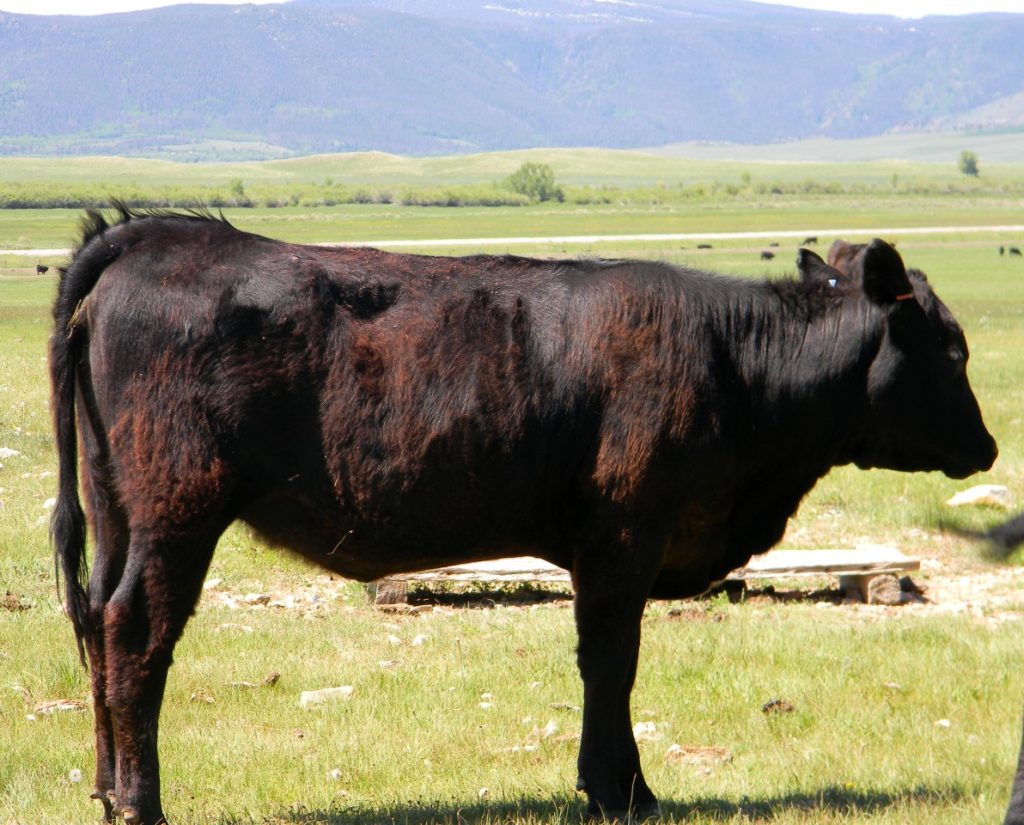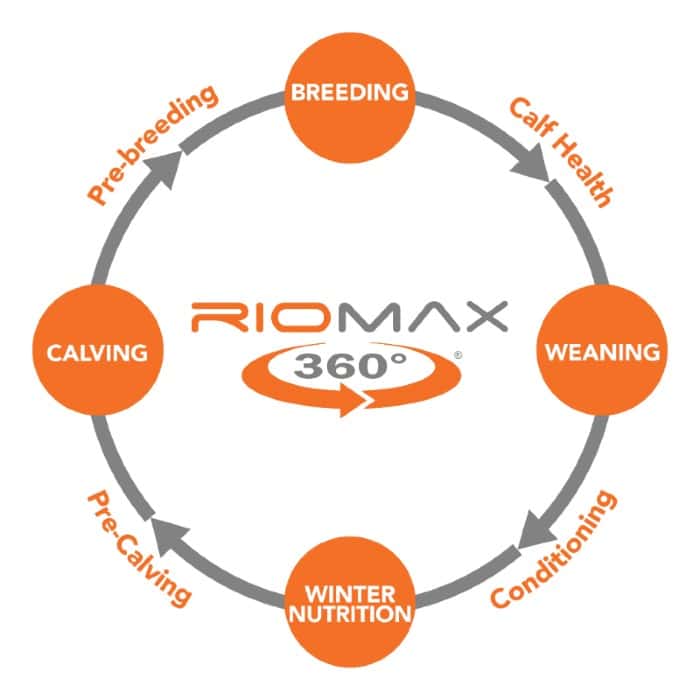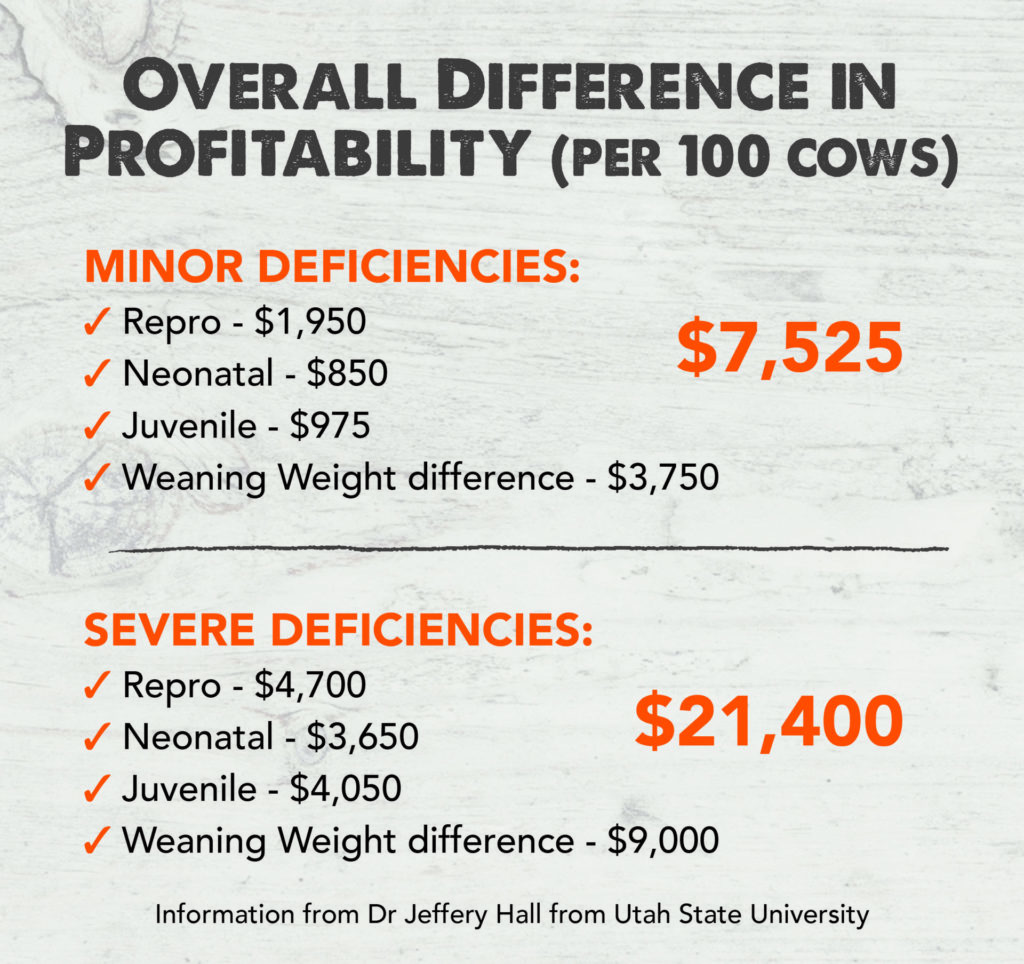Last updated on October 13th, 2023 at 10:41 am
90% of summer illnesses in cows and calves stem from mineral deficiencies.
Yes, 90%.
Dr. Hall* from Utah State University does hundreds of liver biopsies on cattle, and he has discovered that a whopping 90% of the livers he tests for summer sicknesses (like pneumonia) are affected because of a mineral deficiency. He stated that cows should be treated like a factory. You must keep up their level of nutrition for the cows to operate efficiently.
We couldn’t agree more. Here at Riomax®, we’re all about optimizing your herd’s potential and setting them up for success. And as Dr. Hall alluded, it’s difficult for cows to reach their full potential if they don’t have the proper level of nutrition to get there.

What Specific Vitamins & Minerals Do Cattle Need (And Why?)
Before diving into how mineral deficiencies affect cattle, it is important to know which vitamins and minerals cattle need to reach peak performance. Below are a few of the most important vitamins and minerals that cattle require**:
Copper
Not only is copper essential during breed-up, but it also plays a vital role in the synthesis of hemoglobin and bone formation. It helps maintain heart function and formation of connective tissues. When cows become deficient in copper, some of the first things you’ll notice are reduced appetite, stunted growth, rough hair coat, or even sudden death.
Manganese
Manganese is required for proper bone development, growth, reproduction, and is a key component in carbohydrate metabolism. Manganese deficiencies can result in reproductive disorders, reduced fertility, poor growth, weak bones, and even leg deformities.
Zinc
Zinc is required for the metabolism of protein and carbohydrates and is essential in growth and development. Besides this, it aids in healing wounds, tissue repair, and skeletal development. Zinc-deficient cows will often have poor fertility, joint stiffness, an undesirable appearance, and are more susceptible to hoof infection.
Selenium
Selenium is necessary for the development of the pancreas and the integrity of cell membranes. It also plays a critical role in increasing the immune response. Selenium deficiencies can cause white muscle disease, heart failure, paralysis, lower birth rates, weak or stillborn calves, and lower overall immunity.
Vitamin A
Minerals aren't the only important factor. Vitamin A is essential for normal vision, growth, reproduction, and bone development. Deficiencies are most commonly found in beef cattle and show up through reduced feed intake, rough hair coat, fluid accumulation, night blindness, slow growth, diarrhea, low conception rates, stillbirths, blind calves, and more infections.
Vitamin D
Cattle need Vitamin D is for mineral absorption, bone growth, and immune response. Signs of a deficiency may include stiff joints, irritability, convulsions, decreased appetite, digestive issues, labored breathing, and weakness.
Vitamin E
This vitamin serves as an antioxidant in the cow’s body and helps in membrane and muscle formation. Vitamin E is closely linked with selenium, and often a deficiency will result in white muscle disease.
Some Of The Most Common Symptoms Of A Cattle Mineral Deficiency Include:
- Rough hair coat
- Low immunity and susceptible to disease
- Poor fertility
- Stunted growth or poorer growth rates
Mineral Deficiencies During The Cow/Calf Cycle
Unfortunately, every single stage of the cow/calf life cycle is negatively affected when a cow becomes mineral deficient. We’ve broken down the potential problems by the season that they’re likely to happen in. The four seasons are:
- Summer breeding
- Fall weaning
- Winter cow condition
- Spring calving
We understand that you may not run your operation exactly like this (in these specific seasons), but on a cow/calf operation, these four stages are going to happen at some point.

Do Mineral Deficiencies In Cattle Affect Summer Breeding?
There are two ways that ranchers typically think about feeding mineral in the summer.
- You believe whole-heartedly in feeding a summer mineral program.
- You think it’s simply unnecessary to feed mineral in the summer. After all, shouldn’t your cattle get the nutrients they need from the pastures they’re grazing?
For optimal growth and reproduction, cows/calves should always have some sort of mineral supplement available to them - even during the summer months.
Whether you realize it or not, many summer illnesses like pneumonia, grass tetany, foot rot, pink eye, etc. stem from a mineral deficiency. Copper, magnesium, selenium, calcium, phosphorus - whatever mineral it is that your cattle are low on - that is the root cause of many summer sicknesses in cattle.
Even if you don’t experience many summer pasture problems, feeding mineral helps in more ways. Summertime is breeding time for many ranchers, and feeding quality minerals is key in boosting conception rates and creating a tighter breeding window. In fact, ranchers have seen increases in conception rates between 3% and 10% when feeding a high-quality mineral package.
Check out this case study on a rancher from Wyoming who had 100% of his 2-year-old mothers re-bred after a three-month exposure to the bulls!
So, what are we trying to say? Mineral deficiencies may not only be the main cause of summer illnesses, but they may also be preventing your herd from reaching its full breeding and conception potential. Dr. Hall has proven that mineral deficiencies result in a higher percentage of open cows; up to 15% more!
Plus, if mama’s mineral levels aren’t where they should be, she can’t pass as many nutrients on to the fetus and colostrum. Ultimately, this creates a higher risk of scours, pinkeye, and foot rot in the calf.
Mineral Deficiencies In Cattle During Fall Weaning
Mineral deficiencies become most prevalent in the fall when weaning begins. When calves are separated from their mothers, they are evaluated on health, growth, and of course, overall weight. Calves with mineral deficiencies often look under-nourished, have less vigor, and weigh less than calves that have the level of minerals they need.
Not only this, but mineral deficient calves are far more likely to have more health issues and a higher death-rate, because they are more susceptible to respiratory diseases, like pneumonia.
Even with vaccinations, calves with mineral deficiencies may struggle. Most vaccines are designed for cows that already have the right amount of minerals in their system. This means that vaccination will be far more effective on a calf with the right mineral levels, compared to a mineral deficient calf.
Dr. Hall discovered that on average, a minor mineral deficiency will result in a decrease of 20-35 pounds per calf, while a more severe deficiency will cause a decrease of 50+ pounds per calf. That’s something you’d probably want to avoid.
Let’s flip it around and look at some results ranchers have seen after using a good mineral program. Here at Riomax®, we have proven that calves with optimal levels of mineral in their system can weigh up to 40 pounds (and in some cases even more) heavier than calves that are deprived of the minerals and nutrients they need. The graphic below shows statistics from a trial done in Arizona.
Read more about this Arizona field trial here.
Has your herd reached its full potential? There’s a possibility you didn’t even know the heights you could reach - in terms of weaning weights, calf vigor, and overall herd health.
Check out this ‘Big 3 Calculator’; it’ll show you how much potential your operation has in calf weight gains (as well as feed savings!).
How Cattle Winter Nutrition Is Affected By Mineral Deficiencies
Third-trimester health is perhaps one of the most important topics during winter months.
Why?
Mama cow is putting everything she has towards the fetus at this stage. To ensure that the fetus is reaching its full potential, mama must receive all the minerals she needs. That way, when the calf is born, it will be healthy and set up for success.
If mama cow becomes mineral deficient in the winter, it has one main effect. She cannot give the fetus and colostrum the level of minerals and nutrients they need. The mama completely depletes her system to give the calf the best chance of success. So, if the mother’s minerals are not being replenished by some sort of quality supplement, it is likely going to result in both an unhealthy cow and an unhealthy calf.
But, if mama’s mineral levels are at the right standard, the opposite happens. The cow puts all those good minerals and nutrients she receives into the fetus and colostrum - and the calf is immediately set up for maximum success and minimal risk of scours, pinkeye, and foot rot.
How Mineral Deficiencies Affect Cows/Calves During Spring Calving
Spring is a welcome sight after a long winter, but with it comes a whole new set of ranching challenges. Many ranchers calve in the springtime, and sometimes, calf immunity issues seem to be never-ending.
Have you ever wondered if there is anything you can do to reduce calf illness?
The truth is, the battle is already half-done by the time a calf is born. At this stage, the calf’s health is entirely determined by its mama. So, if mama is already mineral deficient, there is a good chance that the calf will suffer from effects as well.
Immediately after a calf is born, the calf needs to get colostrum from its mother. Why? The colostrum is a huge part of what sets up a calf’s immune system because it contains all of the minerals and antibodies that protect the calf from diseases.
Now, if the mama cow is mineral deficient, she is unable to supply the colostrum, and therefore, the calf doesn’t receive those minerals. The effects are compounding. Unhealthy calves result in more sickness and additional treatment costs. The simple math is that more sickness means more deaths. Ultimately, more deaths give you fewer calves to sell, and your bottom line takes an unwanted hit.
By feeding the right minerals - and the ideal amount of them - you make it easier on the cow, the calf, and yourself. If mama starts with everything she needs, she can pass that on to the calf. And, a healthy calf means less of your precious time and money wasted on excess care.
One rancher from Montana discussed his results after calving on a higher quality mineral program.
“...we started timing calves after they hit the ground…. pretty much consistently 7-12 minutes, and then calves were up on the cows. And they just had a lot more vigor in them, just a lot better result.” -Kurt Luoma
Mineral Deficiencies In Cattle Ultimately Affect Your Bottom Line
Cows and calves are negatively impacted in every stage of the life cycle if they don’t have the level of minerals that they require. At first, it might not seem like much of a problem, but at the end of the year, it adds up! The additional time, labor, and costs put towards dealing with and treating mineral deficient cows/calves can be drastically reduced - simply by feeding your cows the mineral supplements they need.
The visual to the right shows the cost mineral deficiencies can have by breaking it down in specifics.

When To Start Feeding A Mineral Program
Deciding when and how to begin feeding mineral (if you aren’t already) depends on your operation, because not everyone runs the same. But we will say this: if you want to see optimal results, we highly recommend having cows on a mineral supplement all year round. The reason for this is because cows need minerals every step of the way. As discussed, every season has critical impacts on the cow/calf life cycle. By supplementing mineral year-round, the problems that mineral deficiencies cause on each stage of the life cycle can be minimized, before it’s too late.
If your cattle aren’t on any sort of mineral supplement now, that’s fair. And you probably have your reasons. But the sooner your cows start consuming the minerals they need, the sooner they can perform better, and the sooner you can see results.
Here at Riomax®, we are driven by results, and anything that can make your life easier. That's why we've designed a quality mineral program that keeps evolving and improving. And the only way we can do that is by listening to you - the rancher. We would love to help you impact your economic model, so you and your operation can become more profitable, and more sustainable.
*Statistics from Dr. Jeffery Hall (Utah State University) source from live presentations. https://advs.usu.edu/directory/faculty/jeffery-hall
**Mineral information derived from https://www.pestellminerals.com/wp-content/uploads/2017/03/Pestell-Minerals-Ingredients-Windsor-Salt-Family-of-Livestock-Salts-Sell-Sheet.pdf and http://www.thebeefsite.com/articles/1549/mineral-and-vitamin-nutrition-for-beef-cattle/




